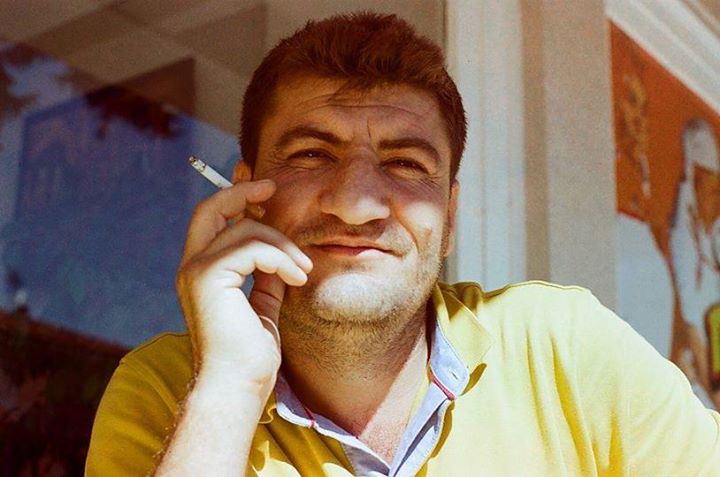يرجع الفضل الأكبر إلى العمل الذي قام به رائد فارس من بلدة كفرنبل، حيث تحولت سوريا إلى مركزٍ للإبداع وضميرٍ للثورة ضد بشار الأسد.
فقد لعب رائد دورًا حاسمًا في حركة المعارضة غير العنيفة من خلال إطلاق أول إعلام مستقل في البلاد ونجى من محاولات اغتيال عديدة حتى سقط صريعا في 23 نوفمبر 2018. كما قُتل معه في هذا الهجوم أيضا صديقه وزميله الناشط حمود جنيد، حيث أطلق المهاجمون المجهولون في سيارة (فان) النار على الرجلين برشاشات.
كان رائد صحفيًا ومنظما إجتماعيا ماهراً في نقل الأخبار والتحليلات إلى العالم الخارجي بنظرة أممية تربط ما بين أحداث الداخل مع ما يجري من قضايا في الخارج في تغريداته، ومنها: “إننا نقف متضامنين مع المظلومين الذين لا يستطيعون التنفس #حياة السود مهمة #BlackLivesMatter”. وقد قامت مجموعة متنوعة من وسائل الإعلام الدولية بالنشر عنه، وإحداها عن دوافع عمله في مجال حقوق الإنسان في المقالة الإفتتاحية بواشطن بوست.
بدأتُ ببث “راديو فريش” في عام 2013 كمحطة محلية ببلدتي كفرنبل، وذلك بهدف إيصال الصوت إلى الجماهير في محافظات إدلب وحلب وحماة. فكان من المهم أن يحصل الشعب السوري على أخبار مستقلة حول ما يجري في وطنهم، حيث لم تكن هناك أي محطة أخرى من هذا النوع في ذلك الوقت.
كصحفي وكناشط، شعرت أن من واجبي مواجهة ما ينشره الأصوليون بين الناس الذين لا مصدر أمل آخر لديهم في وطننا الممزق بالحرب.
اشتد الصراع السوري بسبب ما كسبه الإرهابيون في معركتهم الآيديولوجية التي أصابت روح سوريا في مقتل. منذ ما يربو على ست سنوات، والناس –وبخاصة الأطفال– يعيشون في قرى مثل كفرنبل في بيئة من الحرب والكراهية والعنف ومشاهد سفك الدماء. في غياب أصوات سياسية ديمقراطية سلمية ، تمكن الإرهابيون من إقناع الشباب السوري المعرض للخطر بأن طريق الإستقرار هو من خلال العنف والدمار. مجموعات المجتمع المدني ووسائل الإعلام المستقلة تعمل بلا كلل لمعارضة هذه الأفكار، وذلك بأساليب تكون ذات صدى مقبول لدى الجماهير المحلية. إن مستقبل سوريا الديمقراطي متوقف على نجاحنا.
في مقابلة أجرتها معه هيئة الإذاعة البريطانية (بي بي سي)، عبّر رائد عن أسلوبه الفكاهي الساخر الذي يتبعه في محطته الإذاعية قائلا: “لقد حاولوا إجبارنا على التوقف عن تشغيل الموسيقى على الهواء، فقمنا بوضع أصوات الحيوانات في الخلفية كنوع من الإيماءات الساخرة ضدهم”. بل كان يمازح حول ما تعرض له من أصابة بالرصاص في صدره -والتي كادت أن تودي بحياته- قائلا: “ما زلت أواجه صعوبة في التنفس، ولكن الطبيب أخبرني أنه لا ينبغي أن تكون هناك مشكلة مع التنفس وذلك بسبب حجم أنفي”. ومع ذلك، كان رائد على دراية تامة بمصيره بالموت وبمدى خطورة ما يقوم به من عمل. وفي موقع آخر من المقابلة نفسها قال رائد: “لقد حاولوا قتلي خمس مرات حتى الآن، ولو تم ذلك فليكون، ولكنهم لم ينجحوا بعد. أحاول أن أنجو، ولكن إذا لم أستطع فلا يهمني ذلك”.
أقوى نازله علي حياة رائد، كانت عندما قُتل أحد أصدقائه المقربين وأصيب آخر بجروح بالغة جراء انفجار قنبلة، حيث اعترف فارس بأنه بعد أيام كاد أن ينتحر، ولكنه أصبح بعد ذلك أكثر تصميماً من أي وقت مضى.
قال رائد: “لقد بدأنا الثورة معاً وكنا جميعًا ندرك ما يواجهنا من مخاطر”، مضيفًا: “وهذا يعني أن حياتي ليست أغلى من حياة زملائي الذين لقوا حتفهم”.
كان آخر ما نشره رائد هو شريط فيديو لمظاهرة في بلدته، وفيها: “أهالي كفرنبل في ساحة الحرية يرددون: الشعب يريد إسقاط النظام”. لقد بدأنا هذا في 2011 وسنستمر. وإن ولاءنا للشهداء والمساجين قد زاد من عزيمتنا”.
